|
|
|
Sort Order |
|
|
|
Items / Page
|
|
|
|
|
|
|
| Srl | Item |
| 1 |
ID:
103196
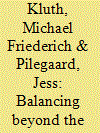

|
|
|
|
|
| Publication |
2011.
|
| Summary/Abstract |
The present paper seeks to make sense of recent European Union (EU) naval capability changes by applying neo-realist theory to the EU as a collective actor in the global balance of power. The paper compares two different strands of neo-realist theory by deducing key predictions about the expected naval posture of the Union and the corresponding expected changes in capabilities. These predictions are subsequently held up against post-cold war data on naval acquisitions in the EU. The paper concludes that the observed patterns are best explained not as bandwagoning with the USA, but as a long-term balancing strategy aimed at bolstering the autonomy and international influence of the Union vis-a-vis other major powers, including the USA.
|
|
|
|
|
|
|
|
|
|
|
|
|
|
|
|
| 2 |
ID:
090273
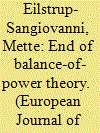

|
|
|
|
|
| Publication |
2009.
|
| Summary/Abstract |
The balance of power is one of the oldest and most venerable concepts in the study of International Relations. Few concepts have had a comparable influence on both scholarship and statesmanship, and few have been so fiercely contested. In a recent article, `Testing Balance-of-Power Theory in World History' (EJIR, June 2007), Wohlforth et al. set out to test balance-of-power theory against 2000 years of world history. Although their article has considerable merits, I highlight three main weaknesses in their approach. First, I argue that they misstate balance-of-power theory. Second, the competing theoretical hypotheses they offer are (a) not novel, (b) too vague to enable productive empirical testing. Third, the historical evidence they present, based on the study of ancient international systems, is too scant and impressionistic to be probative for the causal mechanisms they seek to evaluate. As a result, balance-of-power theory is neither refuted nor significantly refined.
|
|
|
|
|
|
|
|
|
|
|
|
|
|
|
|
| 3 |
ID:
088561
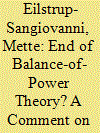

|
|
|
|
|
| Publication |
2009.
|
| Summary/Abstract |
The balance of power is one of the oldest and most venerable concepts in the study of International Relations. Few concepts have had a comparable influence on both scholarship and statesmanship, and few have been so fiercely contested. In a recent article, `Testing Balance-of-Power Theory in World History' (EJIR, June 2007), Wohlforth et al. set out to test balance-of-power theory against 2000 years of world history. Although their article has considerable merits, I highlight three main weaknesses in their approach. First, I argue that they misstate balance-of-power theory. Second, the competing theoretical hypotheses they offer are (a) not novel, (b) too vague to enable productive empirical testing. Third, the historical evidence they present, based on the study of ancient international systems, is too scant and impressionistic to be probative for the causal mechanisms they seek to evaluate. As a result, balance-of-power theory is neither refuted nor significantly refined.
|
|
|
|
|
|
|
|
|
|
|
|
|
|
|
|
| 4 |
ID:
098789


|
|
|
|
|
| Publication |
2010.
|
| Summary/Abstract |
European Union (EU)-Asia relations raise linked problems (on the one hand) of EU collective action and identity and (on the other hand) of cooperation. The relationship is characterized by complexity and variety in three dimensions: first, 'voices' and history; second, institutional engagement and structure; and third, issue structure. In order to explore the implications of this complexity and variety, and to generate propositions for further research, we deploy International Relations theories based on material interests, ideas and institutions. These help us to demonstrate not only the application of 'analytical theory' but also the role of 'practitioner theory' in the evolution of relations between the EU and Asia, and thus to reflect systematically on the problems of collective action and cooperation identified at the beginning of the article.
|
|
|
|
|
|
|
|
|
|
|
|
|
|
|
|
| 5 |
ID:
126088
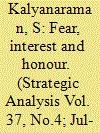

|
|
|
|
|
| Publication |
2013.
|
| Summary/Abstract |
Nearly 2,500 years ago the Greek historian Thucydides noted that the foreign policy of Athens was driven by fear, interest and honour. That these motives continue to drive policy even today is reflected in the three approaches most commonly employed in the study of international relations: realism and neo-realism, which emphasise the pursuit of power and security in an anarchical international system characterised by the security dilemma; liberalism and neo-liberalism, which highlight interdependence and the pursuit of economic interests; and institutionalism and constructivism, which stress upon identity and the quest for prestige and social recognition. 1 How does India's approach to its Asian neighbourhood fit within this three-dimensional framework of fear, interest and honour? That is the question which this commentary explores.
|
|
|
|
|
|
|
|
|
|
|
|
|
|
|
|
| 6 |
ID:
106762


|
|
|
| 7 |
ID:
088095
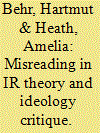

|
|
|
|
|
| Publication |
2009.
|
| Summary/Abstract |
This article is interested in the hegemony which neo-realism accomplished during the second half of the 20th century in both the academic field and policy making of I/international R/relations. Our examination posits the argument that neo-realism can be seen as an ideology rather than a theory of international politics. While this view can connect to individual voices from the 1960s as well as to an emerging body of critical literature since the 1990s, we propose an ideology critique to explore this argument. To unfold this approach we will elaborate some neo-realist misreadings which we think manipulate intellectual history (among others, the writings of Hans J. Morgenthau) and represent an ideological impact intrinsic in the development of IR. An ideology critical approach - which is inherent in Morgenthau's thoughts on international theory themselves and thus helps to reveal profound discrepancies at the heart of an ostensible 'realist'-neo-realist 'unity' - has, firstly, to problematise those discrepancies and, secondly, to focus on hegemonic strategies applied to ideologise and mainstream the academic field. The first part of such an agenda is what we present here; the second part is what we outline methodologically and suggest for further studies in, and of, IR.
|
|
|
|
|
|
|
|
|
|
|
|
|
|
|
|
| 8 |
ID:
091910
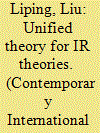

|
|
|
|
|
| Publication |
2009.
|
| Summary/Abstract |
This article puts forward a unified theory for international relations (IR). It first divides current western IR theories into hard and soft categories. then points out conceptual fallacies of the three major debates in the history of western IR theories by using this categorization as an analytical guide. It further asserts that such a categorization should help clarify the present theoretical chaos by pursuing a unified IR theoretical system.
|
|
|
|
|
|
|
|
|
|
|
|
|
|
|
|
|
|
|
|
|